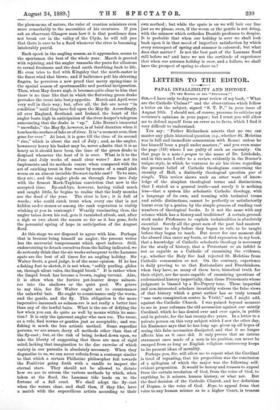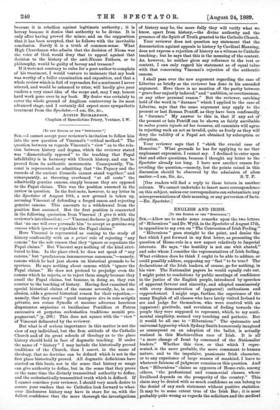LETTERS TO THE EDITOR.
PAPAL INFALLIBILITY AND HISTORY.
[TO TYE EDITOR OF THE " SPECTATOR...1 have only to-day seen your review of my book, " What are the Catholic Claims P" and the observations which follow a letter on the subject, signed " S. T. P.," in your issue of August 10th. I should not, of course, presume to criticise my reviewer's opinions in your paper; but I trust you will allow me to defend myself from an error as to facts, which I find it very difficult to understand.
Yon say " Father Richardson asserts that no • one can master any plain historical question (e.g., whether St. Meletius was in full and immediate communion with Rome) unless he has himself been a pupil under masters ;" and you even name the page (118) where I am guilty of such an enormity. On that page is a note a propos to the name of Dr. Littledale, and in this note I refer to a review, evidently in the Doctor's unique style, in which he ventures to air his views regarding the present belief of Catholic theologians concerning the eternity. of Hell, a distinctly theological question par et simple. This review shows such an utter want of know- ledge of the simplest theological terms and distinctions, that I stated as a. general truth—and surely it is nothing less—that a system like scholastic Catholic theology, with a language of its own, and teeming with technical terms and subtle distinctions, cannot be perfectly or satisfactorily learnt even by a genius, by the simple process of reading vast numbers of theological books. Is it not the same with any science which has a history and traditions? A certain ground- work under Professors to explain technicalities is absolutely essential. Surely all the great men of the past had masters they learnt to obey before they began to rule, to be taught before they began to teach. But never for one moment did the absurd idea enter my brain, or find expression in my book, that a knowledge of Catholic scholastic theology is necessary for the study of history, that a Protestant or an infidel is not as capable as a Catholic of examining the evidence, e.g., whether the Holy See had rejected St. Meletius from Catholic communion or not. On the contrary, experience is daily proving to us that Rationalists and Freethinkers, when they have, as many of them have, historical truth for their object, are far more capable of examining questions of ecclesiastical history impartially, than those Protestants whose judgment is biassed by a No-Popery tone. These impartial and non-interested scholars invariably redress the false views of that history which a great author has so truly termed " une waste conspiration maitre la Write," and, I might add, against the Catholic Church. I was pained beyond measure
to see in your columns the old accusation against our saintly Cardinal, which he has denied over and over again, in public and in private, for the last twenty-five years. In a letter to a private person on this very subject which I saw the other day, his Eminence says that he has long ago given up all hopes of
seeing this false accusation dissipated, and that it no longer affects him as it once did. It only proves that an untrue statement once made of a man in his position, can never be escaped from as long as English religious controversy keeps to its present ideas of morality.
Perhaps you, Sir, will allow me to repeat what the Cardinal is tired of repeating, that his proposition was the conclusion of a syllogism of which the major was the following self- evident proposition. It would be heresy and treason to appeal from the certain revelation of God, from the voice of God, to
anything, be it science, human history, or what not. But the final decision of the Catholic Church, and her definition of Dogma, is the voice of God. Ergo, to appeal from that voice to any human .science as to a higher Court, is treason because it is rebellion against legitimate authority ; it is heresy because it denies that authority to be divine. It is only after having proved the minor, and on the supposition that it has been accepted, that he follows with the inevitable conclusion. Surely it is a. truth of common-sense. What High Churchman who admits that the decision of Mem was the voice of God, would deny that to appeal against that decision to the history of the anti-Nicene Fathers, or to philosophy, would be guilty of heresy and treason ?
If it were not contrary to rules for a poor author to complain of his treatment, I would venture to insinuate that my book was worthy of a fuller examination and exposition, and that a whole review which is full of reproaches for a sentiment I never uttered, and would be ashamed to utter, will hardly give your readers a very exact idea of the scope and, may I say, honest hard work gone over in my book. My desire was certainly to cover the whole ground of Anglican controversy in its most advanced stage, and I certainly did expect more sympathetic treatment from the Spectator.—I am, Sir, &c.,
AUSTIN RICHARDSON,
Chaplain of Benedictine Priory, Ventnor, I.W.



































 Previous page
Previous page